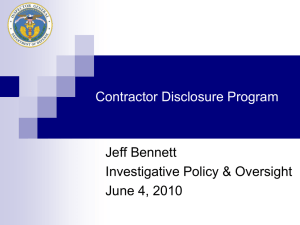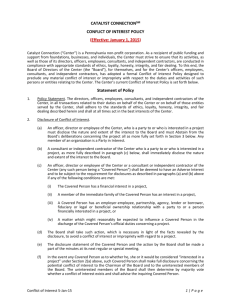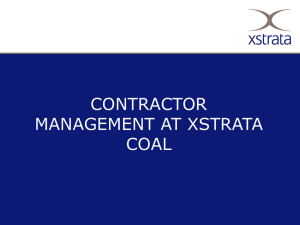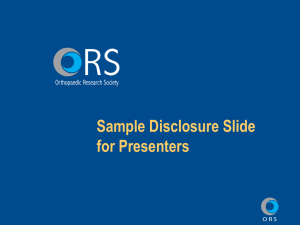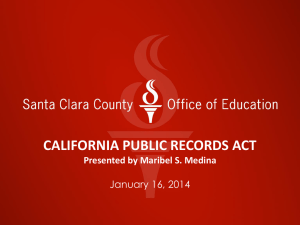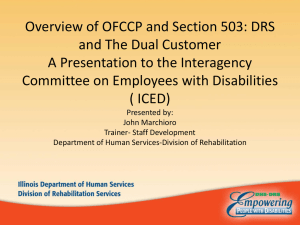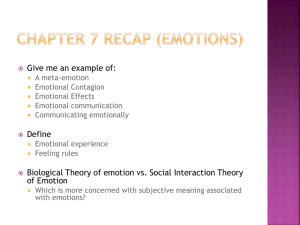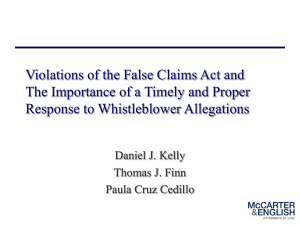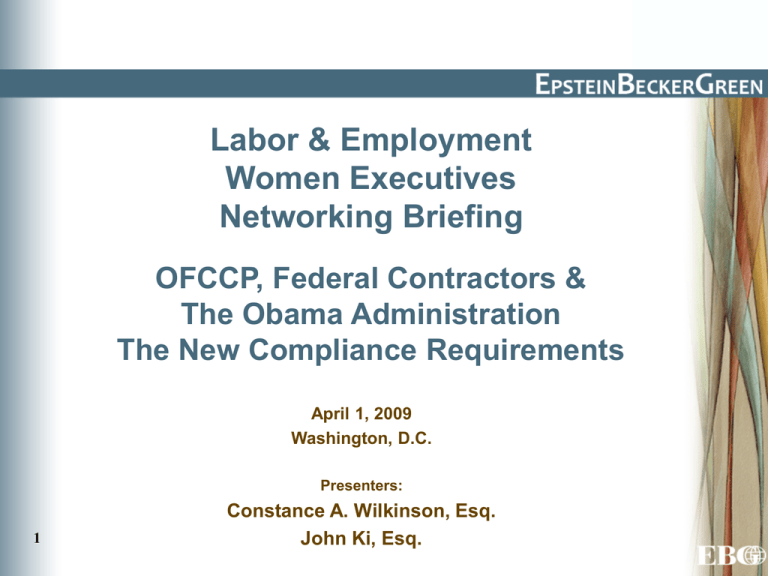
Labor & Employment
Women Executives
Networking Briefing
OFCCP, Federal Contractors &
The Obama Administration
The New Compliance Requirements
April 1, 2009
Washington, D.C.
Presenters:
1
Constance A. Wilkinson, Esq.
John Ki, Esq.
Nondiscrimination and Affirmative Action
Federal government contractors subject to Executive
Order 11246, Section 503 of the Rehabilitation Act of
1973, Vietnam Veterans’ Readjustment Act of 1974 (all
as amended)
Taken together, these laws prohibit discrimination and
require Federal contractors and subcontractors to take
affirmative action to ensure that all individuals have
an equal opportunity for employment, without regard to
race, color, religion, sex, national origin, disability or
status as a Vietnam era or special disabled veteran.
Enforced by the Office of Federal Contract Compliance
Programs (OFCCP)
2
FY 2008
During Fiscal Year (FY) 2008, the OFCCP recovered a
record $67,510,982 in back pay and salary and benefits
on behalf of 24,508 individuals
The FY 2008 financial recovery is a more than 20%
increase over the amount recovered in FY 2007
($51,680,950) and a 133% increase over the amount
recovered in FY 2001 ($28,975,000)
99% was recovered in cases of systemic discrimination
or those involving a significant number of workers or
applicants subjected to discrimination because of an
unlawful employment practice or policy
3
Not Your Father’s Affirmative Action
Specifically prohibits quota and preferential
hiring and promotions under the guise of
affirmative action numerical goals (41 CFR
60-2.12(e), 60-2.30 and 60-2.15)
“No quotas” mantra was emphasized under
Bush administration
4
Affirmative Action Plans
5
Goal Setting Reports
Workforce Analysis or Organizational Profile
Job Group Analysis
Availability Analysis and Backup Census Data
Utilization (Comparison of Incumbency to Availability)
Goals
Personnel Activity Reports
Placement Activity Report
Narrative Discussion of Prior Years’ Goals
Impact Ratio Analysis
• Adverse Impact Analysis
• Overall Selection Rate Analysis
• Two Standard Deviation Analysis
Compensation Analysis
Special Rules
Internet Applicant Rule
Racial categories (two or more races)
Focus on statistical analysis: impact-ratio
analysis
6
What Now?
What do you do with your written AAP?
Self-Analysis
Identification of Problem Areas
Proactive Approach
7
OFCCP Audits
“Contracts First”
Corporate Scheduling Announcement Letters
(CSAL)
30-Days from receipt of letter to submit AAP
8
Audit Review
“Active Case Management” (ACM)
Priority review – looking for statistical indicators
of adverse impact
Desk audit vs. On site audit
1 in every 50 will be subject to full on-site review
9
Best practices
NO RED FLAGS
Ensure that underlying data is accurate and
reliable
If red flags appear, address them “as much as
possible” before submitting the AAP
10
Consequences
Conciliation Agreement
Monetary penalties, including fines
Back pay
Debarment
Ongoing scrutiny
11
What to look forward to. . .
Continued focus on statistical indicators,
but expect a pullback from “single-minded
focus” on statistical back to other aspects
of AAPs
Online filing of AAPs
Compensation analysis
More enforcement
12
Obama Executive Orders
"Notification of Employee Rights Under Federal Labor
Laws”
Requires employers that contract with the federal
government to formally notify employees of their rights
under the NLRA
Until now, employers have generally not been required to
affirmatively post notices advising employees of their
rights under the NLRA.
13
Obama Executive Order
"Nondisplacement of Qualified Workers Under
Service Contractors"
Requires contractors, when they replace another
contractor, to offer employment to the previous
contractor’s employees on that job (other than
managerial and supervisory personnel) — giving
the workers a so-called “right of first refusal.”
14
Obama Executive Order
"Economy in Government Contracting“
Prohibits government agencies from considering
as "allowable costs" those costs and expenses
incurred by federal contractors to influence
workers in deciding whether to form unions
and/or engage in collective bargaining.
15
Final Rule: Federal Ethics
Contractor Business Ethics Compliance
Program and Disclosure Requirements,
73 Fed. Reg. 67064-67093 (Nov. 12, 2008),
effective Dec. 12, 2008
– Revised FAR 52.203-13 to impose more stringent
compliance and reporting requirements
– For all contractors:
– Mandatory disclosure
– Code of business ethics and conduct
– For other than small business or commercial items:
– Business ethics awareness and compliance program
– Internal control system
– Subcontract flow down (if >$5M, 120 days term)
16
Mandatory Disclosure
WHAT? Timely disclose “credible evidence” of -– “Significant overpayments”, under FAR
– Federal criminal law violations, including fraud,
conflict of interest, bribery, improper gratuities
– Civil False Claims Act violations
– In connection with contract/subcontract award,
performance, closeout
BY WHOM? Include conduct of the contractor’s
principal, employee, agent or subcontractor
TO WHOM? Disclose to the agency OIG, copy
the Contracting Officer
17
Mandatory Disclosure
WHEN? “Timely” is undefined
“Credible evidence” standard is undefined
but requires “preliminary examination of
the evidence to determine its credibility”
– Conduct internal investigation of allegations
– Determine whether “credible evidence” of a
violation exists, based on the facts, the legal
standards, and expert advice, as necessary
– Document the investigation and the basis for
the decision whether or not to disclose
18
Mandatory Disclosure
STARTING WHEN? Multi-year contracts may include FAR 52.203-
13 (December 2007), but
Mandatory disclosure requirement, effective 12/12/08, is driven by
statute
FAR subjects contractors to penalty for noncompliance with
mandatory disclosure requirement, “whether or not the clause at
52.203–13 is applicable,” by providing that a contractor may be
suspended and/or debarred for knowing failure by a principal to
timely disclose credible evidence of the referenced violations
Three-year “look-back” period is based on “final payment” under
closed contacts
– Prior contracts may be subject to reporting obligations depending on
timing of audit/closeout
19
Implications for Federal Contractors
Cost accounting and charging
Certifications
– Certificate of Current Cost or Pricing Data
– Certification of Final Indirect Costs
– Certification and Disclosure of Payments to
Influence Certain Federal Transactions
– COI certifications
Reports
– EEO, Small Business Subcontracting Plan
20
Comparison to 2007 Rule
Awareness-compliance program expressly
requires an “effective training program”
– “Reasonable steps to communicate
periodically and in a practical manner” the
contractor’s standards and procedures
– Extends to “principals” and subcontractors
and agents, as appropriate
Internal control system requires screening
of principals and periodic review of
program to assess effectiveness and risk
21
Compliance Strategies
List contracts within scope of reporting
obligation
Identify “principals”
– Principal means an officer, director, owner,
partner, or a person having primary
management or supervisory responsibilities
within a business entity
– Intended to be construed broadly
Survey and obtain disclosure statements
22
Compliance Strategies
Assess/supplement training materials to ensure appropriate
coverage of legal standards
– False Claims Act, conflict of interest, procurement integrity
Review adequacy of internal procedures to identify and assess
possible violations for determination of “credible evidence”
– Coordination by CCO or others?
– Need for revision of subcontract/teaming agreements to flow-down
disclosure requirements and permit investigation and disclosure of
business partner violations
Consider appropriate level of legal involvement in internal
investigation and deliberation
– Process, but not underlying violation, may be subject to attorney-client
communication and attorney work-product privileges
Mark written disclosures with restrictive legend
– Confidential and Proprietary - Exempt from release under FOIA
23
Open Issues/Questions
Agency-specific requirements for content/form of
disclosure
Effect of consideration of disclosures in past
performance and responsibility determinations
Need to reconcile the “adequate evidence” standard for
suspension decisions (FAR 9.407-1(B)(1) with the
“credible evidence” standard for mandatory disclosures
Timeframe for incorporating DEC 2008 version of clause
into current contracts
– Modification with consideration?
• Extension of time for implementation?
24



